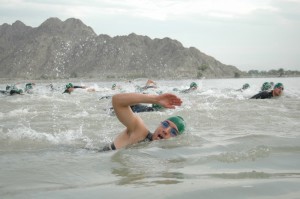Is There Anything So Unpleasant We Won’t Pay to Do It For Fun?

Photo by Micheal O. Foley for The Desert Sun
The Barkley Marathons, held every year in the rugged hill country of Tennessee, pit runners against their absolute mental and physical limits. The race is five 20-mile loops, almost entirely off-trail, with a total elevation gain that more than doubles the height of Mt. Everest. In three decades, only 14 people have ever finished.
That’s 100 miles, for those of you who are math-averse. (I think it is, anyway; I’m pretty math averse myself.) A Times article on the grueling ultra-marathon adds more grisly details:
A 60-hour time limit forces competitors to run, climb and bushwhack for three days with little or no sleep. They endure taunts from the race director, who deliberately keeps the competition’s entry procedure a mystery. It is a race in which there are no comfort stations, and runners cannot use a GPS device or a cellphone. Less than 2 percent of the nearly 800 ultrarunners who have subjected themselves to this punishment — 12 men, the same number as have walked on the moon — have finished the race in its current iteration. The only prize is that after 100 miles, they get to stop.
At least they don’t have to pay too much to be among the many who fail. The race costs less than $2 to enter. Still, for something that sounds so awful, wouldn’t you think someone would have to pay you?
Yet people pay hundreds of dollars to run a marathon — which is to say, they give over significant amounts of their hard-earned money for the privilege of moving more quickly than their bodies would like to for an absurdly long stretch of time, becoming sweaty and often nauseous in the process, sometimes pooping in their pants, and subsisting on pouches of neon-colored goo. People pay to climb tall, frigid mountains or to hike endless, unwelcoming trails; they pay to pretend they are crossing the border from Mexico to America; they pay to tackle obstacle courses that sort of simulate basic training.
There is almost no experience so unpleasant that someone will not gladly trade cash to try it, at least if you call it “exercise.” Even experiences that — like having to run 100 miles in the Tennessee wilderness — would probably qualify as torture if someone else told you to do them.
I get that, to some degree, it’s about pushing yourself, seeing what you’re capable of. I get that the roar of the crowd as you stride by can be addictive. It’s great to be able to slap a “26.2” sticker on your stainless steel water bottle or the back of your SUV. Some people enjoy challenge and competition. Sure. But is there more to it? Are extreme sports a way that relatively fortunate and affluent people handle our collective guilt at not having to deal with the suffering faced by much of the rest of the world? To cheat / court death? To build character? What are we trying to prove?
Support The Billfold
The Billfold continues to exist thanks to support from our readers. Help us continue to do our work by making a monthly pledge on Patreon or a one-time-only contribution through PayPal.
Comments